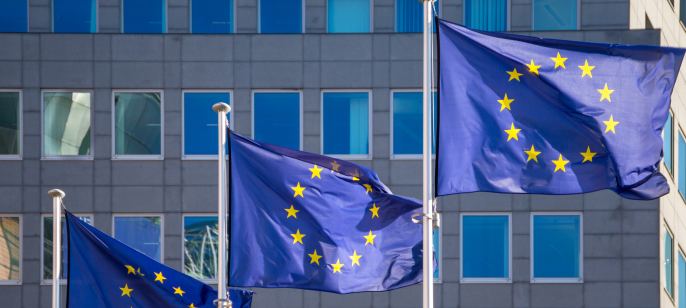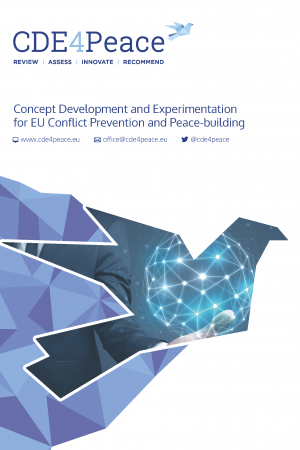
About

| Acronym: | CDE4Peace |
|---|---|
| Programme | Horizon 2020 |
| Duration: | 09/2020 to 08/2022 |
| Topic: | MSCA-IF-2019 – Individual Fellowships |
| Call: | H2020-EU.1.3.2. - Nurturing excellence by means of cross-border and cross-sector mobility |
| Funding: | MSCA-IF-2019 Individual Fellowships |
Project Objectives
Explore
The project’s principal research objective is to explore the potential of Concept Development and Experimentation for enhancing the EU’s conflict prevention and peace-building policy.
Review
The project will conduct desk review and quantification of selected strategic and operational concepts in the field of EU conflict prevention and peace-building.
Assess
The project aims at assessing the applicability and compatibility of Concept Development and Experimentation with strategic and operational concepts in the area of EU conflict prevention and peace-building.
Innovate
The project seeks to introduce and adapt CDE to EU conflict prevention and peace-building by defining the requirements for an innovative CDE tool tailored for this specific policy area.
Recommend
Finally, the project will define actionable policy recommendations for implementing the CDE methodology and tools in the complex EU policy-making process.
Project Methodology
The project employs an interdisciplinary methodology for applied policy research which links qualitative research methods from Conflict and Peace studies with quantitative CDE tools. This innovative research methodology follows a four-phase operational logic, as follows:
In Phase 1 (REVIEW) the project conducts desk review and quantification of selected strategic and operational concepts in the field of EU conflict prevention and peace-building.
In Phase 2 (ASSESS) the project identifies available and emerging CDE tools and evaluates their potential, applicability and compatibility with strategic and operational concepts in the area of EU conflict prevention and peace-building. The empirical research work will apply the ‘technology watch’ method.
In Phase 3 (INNOVATE) the project defines the requirements for an innovative CDE tool which is tailored for the specific area of EU conflict prevention and peace-building.
In the final Phase 4 (RECOMMEND) the project provides actionable policy recommendations for integrating the CDE methodology in the EU policy decision-making cycle.
Impact on the academic and policy debate
The project will have a clear impact on the academic and policy debate over EU conflict prevention and peace-building and the future of CSDP. At the European level, there is a strong need for objective and efficient tools for testing and validating novel concepts and approaches in this politically sensitive area. Therefore, by exploring the role of CDE for EU conflict prevention and peace-building the project will have clear added value for the European Research Area (ERA), the competent EU institutions and, specifically for the European External Action Service (EEAS).
Project Structure
WP1 Project Management.
WP1 provides the smooth running of the project, including administrative, financial and ethical issues as well as risk management.
WP2 Training
WP2 will organize the project’s four training modules.
WP3 Review
WP3 will carry out desk review and quantification of selected strategic and operational concepts in the field of EU CPPB. The analysis of strategic concepts will focus on resilience and the integrated approach; conflict sensitivity and the whole-of-society concept. The analysis of operational concepts will focus on three EU missions (EULEX Kosovo; EUTM Mali and EUBAM Libya).
WP4 Assess
Objectives: identification and technology assessment of available and emerging CDE tools on the European market and evaluation of their potential for EU CPPB. The empirical research under WP4 includes open-source data collection (monitoring of CDE providers’ websites and software reviews) and fieldwork: direct observation of CDE demonstrations at two industrial exhibitions as well as 25 qualitative interviews with representatives of relevant companies, developers and end-users.
WP5 Innovate
WP5 will define the requirements for a CDE tool tailored specifically for EU CPPB. Drawing upon the concepts’ review (WP3) and technology assessment (WP4) the innovation WP5 will elaborate the requirements for a potential new CDE tool for EU CPPB.
WP6 Recommend
WP6 will deliver policy recommendations for integrating the CDE methodology and tool in the EU policy decision-making cycle. WP6 will develop an analytical framework for CDE as a policy tool and will distill the main policy-relevant findings and recommendations from the project.
WP7 Dissemination, communication and exploitation
WP7 Dissemination, communication and exploitation entails the project’s dissemination and communication measures and the activities for the exploitation of project results.
Project Abstract (German)
Konzeptentwicklung und experimentellen Überprüfung zur Verbesserung der EU-Politik in Sachen Konfliktprävention und Friedenskonsolidierung (CDE4Peace)
Die Förderung eines dauerhaften Friedens und Beiträge zur Konfliktprävention über ihre Grenzen hinaus gehört zu den Prioritäten der EU. Friedenskonsolidierung ist zwar einer der Kernwerte der EU, stellt aber gleichzeitig eine große Herausforderung dar. Das EU- finanzierte Projekt CDE4Peace wird das Potenzial der Konzeptentwicklung und experimentellen Überprüfung (Concept Development and Experimentation, CDE) zur Verbesserung der EU-Politik in Sachen Konfliktprävention und Friedenskonsolidierung erkunden. Die Methode Konzeptentwicklung und experimentelle Überprüfung kann bei der Transformation komplexer Sicherheitssysteme zum Einsatz kommen. CDE4Peace wird die Konzeptentwicklung und experimentelle Überprüfung einführen und an die Konfliktprävention und Friedenskonsolidierung der EU anpassen, indem die Anforderungen an ein auf diesen speziellen Politikbereich zugeschnittenes innovatives CDE-Instrument definiert werden. Das Projekt wird außerdem fundierte politische Empfehlungen für die Umsetzung der Methodik und der Werkzeuge der Konzeptentwicklung und experimentellen Überprüfung innerhalb des komplexen politischen Entscheidungsfindungsprozesses der EU festlegen. Eine interdisziplinäre Methodik für angewandte Politikforschung wird die Überprüfung des Konzepts, die Bewertung der Werkzeuge, die Definition der Anforderungen sowie die Ausarbeitung von Empfehlungen zur Einbindung der Methodik der Konzeptentwicklung und experimentellen Überprüfung in die Entscheidungsfindung der EU zum Inhalt haben.



